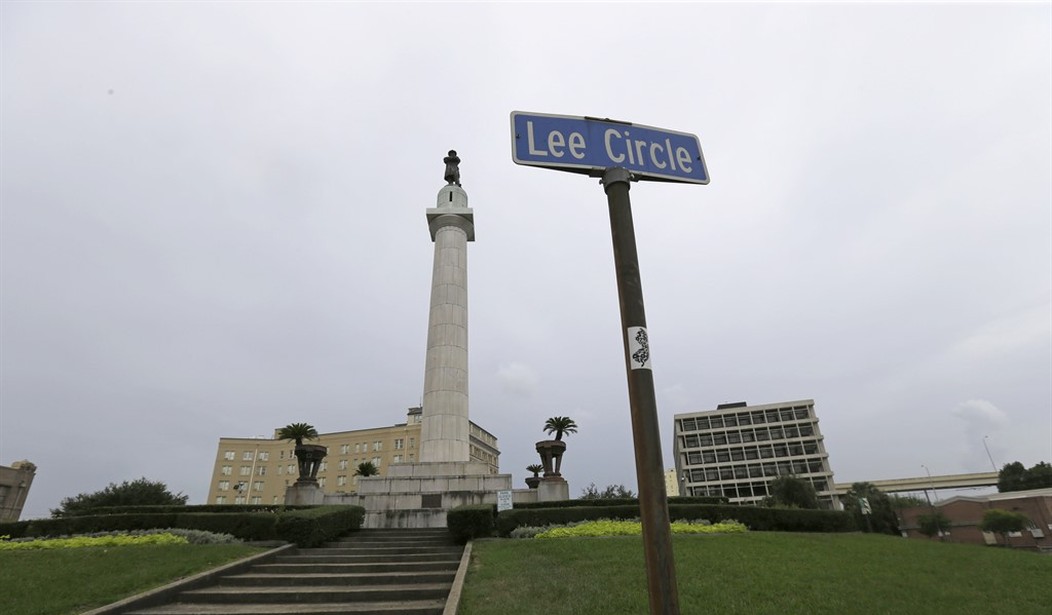Somehow I don’t think this story is going to draw as much press attention as the fights over the Confederate Battle Flag of the past couple years, but you’ll quickly see some parallels. Down in New Orleans, city workers showed up in the dead of night and began removing one of four monuments near Canal Street which were originally dedicated to people and events from the civil war era. This one, labeled by the Mayor as “the worst of the lot,” was dedicated to the Crescent City White League and the Battle of Liberty Place. (NBC News)
New Orleans officials were preparing to begin removing the first of four prominent Confederate monuments early Monday, the latest Southern institution to sever itself from symbols viewed by many as a representation racism and white supremacy.
The first memorial to come down will be the Liberty Monument, an 1891 obelisk honoring the Crescent City White League. Workers arrived to begin removing the statue, which commemorates whites who tried to topple a biracial post-Civil War government in New Orleans, around 1:25 a.m. in an attempt to avoid disruption from supporters who want the monuments to stay, some of whom city officials said have made death threats.
The workers who were inspecting the statue ahead of its removal could be seen wearing flak jackets and helmets. Police officers watched the area from atop the parking garage of a nearby hotel.
There have been death threats flying about over the removal of the monuments and it’s got the city on edge, much like the previous battles over Confederate Battle Flags. But if the activists calling for their removal had to pick one to start with, this was clearly the low hanging fruit of the bunch. The Battle of Liberty Place was a rather obscure insurrection where the Crescent City White League attempted to overthrow the reconstruction government and assert white supremacy in the region. And when you name yourself the “white league” it makes for a pretty tough defense in the 21st century, let’s face it.
But much like everything else in these ongoing debates, that battle was part of the nation’s history during a very troubled period. Taking down the statue doesn’t erase it from living memory as much as some might wish it could. Rather than lionizing the Crescent City White League, proponents argue that it also serves as a reminder of how bad things got in some areas during reconstruction and just how far we’ve come since then.
The fight in favor of removal becomes more problematic with the next three monuments slated for eviction. They are memorials to Robert E. Lee, P.G.T. Beauregard and Jefferson Davis. Are we to pretend that those men never lived or that they never fought for what they considered to be their own sovereign territory? Shall we just delete the entire civil war from the history books? Depending who you ask, some might argue that it wouldn’t be such a bad idea. After all, anything can be spun into the object of protests if you’re willing to twist reality enough. Just recently we saw a college in Massachusetts taking down the American (not Confederate) flag because it was a “symbol of racism.” Some anchors on CNN have suggested that we may need to remove the Jefferson Memorial from Washington because he was a slave owner. Where does it end?
There is something inherently destructive and short-sighted about these efforts to whitewash our history (if you’ll pardon the phrase.) I spent some time stationed outside of New Orleans when I was in the navy and had the chance to see and photograph several of the monuments under discussion. (When I was there, the Liberty Monument was still in its original location right in the middle of Canal Street. It was later moved.) These are long standing memorials to a controversial but still important and very real part of our history. They should definitely spark civil discussions about the nation and how the past shaped who we were and the journey to come. Removing them because you find the nation’s history offensive is shallow and does a disservice to the generations to come. But it’s the path that New Orleans has now chosen, so we’ll have to rely on photographs to remember them in the future.








Join the conversation as a VIP Member